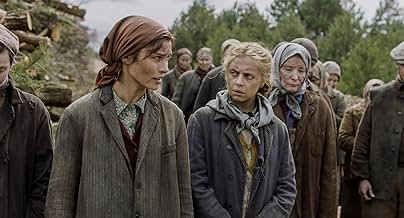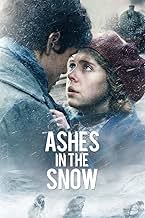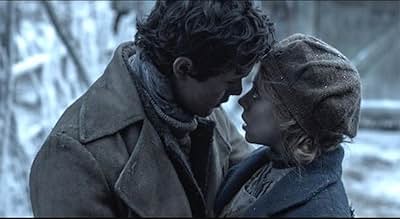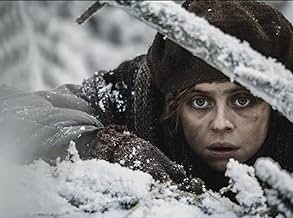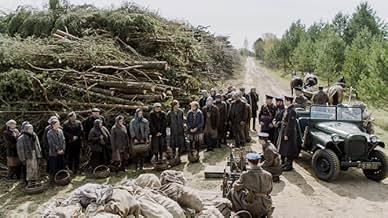AVALIAÇÃO DA IMDb
6,6/10
7,3 mil
SUA AVALIAÇÃO
Em 1941, uma aspirante a artista de 16 anos e sua família são deportados para a Sibéria durante o desmantelamento da região do Báltico por Stalin. A paixão de uma menina pela arte e sua espe... Ler tudoEm 1941, uma aspirante a artista de 16 anos e sua família são deportados para a Sibéria durante o desmantelamento da região do Báltico por Stalin. A paixão de uma menina pela arte e sua esperança eterna quebrarão o silêncio da história.Em 1941, uma aspirante a artista de 16 anos e sua família são deportados para a Sibéria durante o desmantelamento da região do Báltico por Stalin. A paixão de uma menina pela arte e sua esperança eterna quebrarão o silêncio da história.
- Direção
- Roteiristas
- Artistas
- Prêmios
- 6 indicações no total
Avaliações em destaque
Greetings again from the darkness. Most World War II films focus on the atrocities committed by Hitler's German forces, but this adaptation of Ruta Sepetys' novel ("Between Shades of Gray") reminds us of the evils under Stalin and the Russian seizure of the Baltic States. Director Marius A Markevicius delivers a feature film debut that is both historical drama and tale of human perseverance.
We have long since been educated on just how cruel humans can and have been to other humans, and director Markevicius - with a script from Ben York Jones (LIKE CRAZY, 2011) - doesn't shy away from the cruelty or atrocities, but he and cinematographer Ramunus Greicius capture the harshness and brutality of the Siberian environment, as well as the brief moments when those being held captive feel sparks of life.
Bel Powley (THE DIARY OF A TEENAGE GIRL, 2015) stars as Lina, a young Lithuanian artist who lives with her family: mother Elena (Lisa Loven Kongsli, FORCE MAJEUR) and brother Jonas (Tom Sweet). The father/husband is played by Sam Hazeldine and we learn of his secret agenda and activism later in the film. When Russian troops forcibly remove mother and the two kids from their home, a long train ride ends with their working the fields in the Altai Labor Camp in Siberia.
Martin Wallstrom is excellent as Kretzky, a conflicted Russian soldier from the Ukraine. He's kind of persona non-grata on both sides, and as an outsider to the troops and the "devil" to the prisoners, he is somewhat of a sympathetic character. A year later (1942), the family and Officer Kretzky are shipped off to Laptev Sea in the Arctic Circle. This frozen tundra is no place for human beings and death seems preferable to freezing in misery. When giving the relocation order, Kretzky's commanding officer calls them "one big happy family in frozen hell". It's a great line. An acutely descriptive line.
Young Lina's childhood innocence has been shattered, but she possesses an inner strength that only such miserable circumstances could unveil. She carries on finding brief respites in her art and in fleeting romance with fellow prisoner Andrius (Jonah Hauer-King).
There is a story told, a legend really, about a fishing boat and its survivors - the correlation made late in the film. The devastating circumstances and desolate landscape are accompanied aptly by German composer Volker Bertelmann. But let's face it, war crimes against the innocent are tough to watch even in movie form, and this film, regardless of how expertly it's crafted, is relentless in bleakness - though heartfelt and sincere.
We have long since been educated on just how cruel humans can and have been to other humans, and director Markevicius - with a script from Ben York Jones (LIKE CRAZY, 2011) - doesn't shy away from the cruelty or atrocities, but he and cinematographer Ramunus Greicius capture the harshness and brutality of the Siberian environment, as well as the brief moments when those being held captive feel sparks of life.
Bel Powley (THE DIARY OF A TEENAGE GIRL, 2015) stars as Lina, a young Lithuanian artist who lives with her family: mother Elena (Lisa Loven Kongsli, FORCE MAJEUR) and brother Jonas (Tom Sweet). The father/husband is played by Sam Hazeldine and we learn of his secret agenda and activism later in the film. When Russian troops forcibly remove mother and the two kids from their home, a long train ride ends with their working the fields in the Altai Labor Camp in Siberia.
Martin Wallstrom is excellent as Kretzky, a conflicted Russian soldier from the Ukraine. He's kind of persona non-grata on both sides, and as an outsider to the troops and the "devil" to the prisoners, he is somewhat of a sympathetic character. A year later (1942), the family and Officer Kretzky are shipped off to Laptev Sea in the Arctic Circle. This frozen tundra is no place for human beings and death seems preferable to freezing in misery. When giving the relocation order, Kretzky's commanding officer calls them "one big happy family in frozen hell". It's a great line. An acutely descriptive line.
Young Lina's childhood innocence has been shattered, but she possesses an inner strength that only such miserable circumstances could unveil. She carries on finding brief respites in her art and in fleeting romance with fellow prisoner Andrius (Jonah Hauer-King).
There is a story told, a legend really, about a fishing boat and its survivors - the correlation made late in the film. The devastating circumstances and desolate landscape are accompanied aptly by German composer Volker Bertelmann. But let's face it, war crimes against the innocent are tough to watch even in movie form, and this film, regardless of how expertly it's crafted, is relentless in bleakness - though heartfelt and sincere.
It's really important to understand the atrocities and oppression of the Russian government over Eastern Europeans. This film takes place during World War II but even under the Tsar/Czar in the late 1800's and early 1900's, Russia was trying to erase Lithuanian and other conquered cultures with such things as Banning the local language and books.
This film shows us that the Russians were not much better than the Nazis when it came to concentration/labor camps. Without spoilers, it's heartbreaking and horrible what they did to millions of people from the 1930s to the 1950s. I have Lithuanian family who were deported to Siberia and not released for 15 years! Watching this you will understand what they say and so many went through.
This film shows us that the Russians were not much better than the Nazis when it came to concentration/labor camps. Without spoilers, it's heartbreaking and horrible what they did to millions of people from the 1930s to the 1950s. I have Lithuanian family who were deported to Siberia and not released for 15 years! Watching this you will understand what they say and so many went through.
Film was not a big-budget, multi continent blockbuster. But it was entertaining, and enjoyable, and achieved its objective.
Overall well written, good screenplay, well edited. Captured the narrative (I assume that) they wanted us to have.
Would I watch it again? I doubt it. Would I recommend it, maybe not recommend it, but if someone wanted to watch something in this class I would definitely suggest it.
Full credit to all involved, if you are not sure if you want to watch it you should, they did it very well
It's a good movie about the Soviet invasion of Lithuania; the plot is good and the acting is decent; it is recommended.
'Ashes in the Snow' is a war drama that tugs at the heartstrings. Note, this is not a film about soldiers on the battlefield. Instead, it concentrates on how it affects the people, and in particular Lithuanians.
One can only cringe at the inhumane things humans did during war, simply because their government expected it of them. It turned ordinary men into coldblooded killers. This film also showed us the reluctant soldiers. Men who found themselves in situations they dreaded. Yet, they still had orders to follow...
The acting is very good, especially Bel Powley as heroin Lina. We follow her family as they are taken from the comfort of their home, to a six-week long harrowing journey on a train, to a prison camp in Siberia, and finally to the freezing Laptev Sea. This is an emotional and heartfelt journey sure to set emotions in motion.
One can only cringe at the inhumane things humans did during war, simply because their government expected it of them. It turned ordinary men into coldblooded killers. This film also showed us the reluctant soldiers. Men who found themselves in situations they dreaded. Yet, they still had orders to follow...
The acting is very good, especially Bel Powley as heroin Lina. We follow her family as they are taken from the comfort of their home, to a six-week long harrowing journey on a train, to a prison camp in Siberia, and finally to the freezing Laptev Sea. This is an emotional and heartfelt journey sure to set emotions in motion.
Você sabia?
- Curiosidades"Ashes in the Snow" is the #1 highest box-office grossing film of all-time in Lithuania, the country where the story and production took place, beating out such mega studio titles as "Avatar" and "50 Shades of Grey".
- Erros de gravaçãoIn the scene with the sled dogs, the dogs are connected wrong. The ganglion hitch is used in North America. In Russia, they would use a fan hitch.
Principais escolhas
Faça login para avaliar e ver a lista de recomendações personalizadas
- How long is Ashes in the Snow?Fornecido pela Alexa
Detalhes
Bilheteria
- Orçamento
- US$ 5.000.000 (estimativa)
- Faturamento bruto mundial
- US$ 1.578.991
- Tempo de duração
- 1 h 38 min(98 min)
- Cor
Contribua para esta página
Sugerir uma alteração ou adicionar conteúdo ausente



